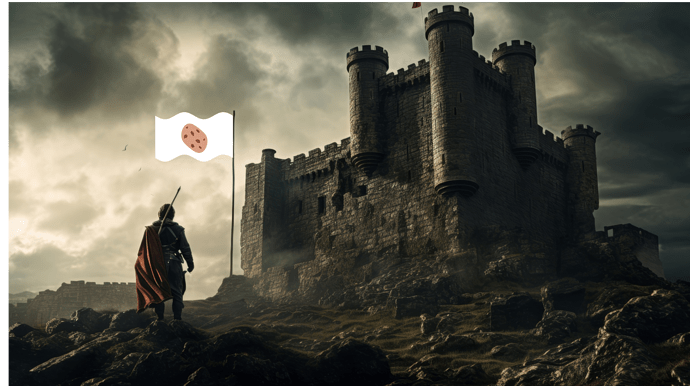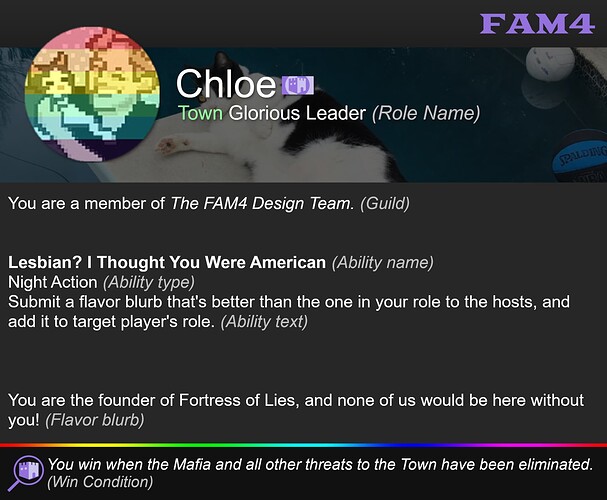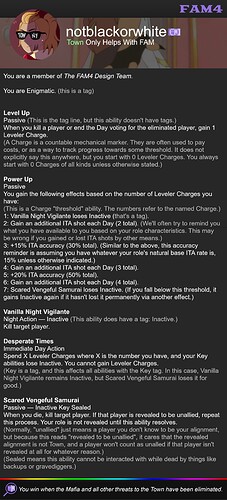Abilities, Effects, and Action Resolution
I. General Ability Information
The following is true about abilities:
- Actions cannot be used and abilities cannot trigger during Night 0 unless otherwise stated.
- Immediate Day Action submissions are ignored during ITA windows. We prefer you do not try to submit them during ITA windows at all.
- You may not choose or target yourself as a player with actions unless otherwise stated. This only applies when a player is selected. If an effect says something like “Choose a Guild,” you may choose your own.
- To “visit” another player means you have targeted that player with an action, and that action has resolved. An action does not resolve if it is blocked or fails for another reason (i.e. the player is un-targetable because of a commute). It does resolve if its target was protected, immune, or otherwise unaffected. An action that does not target, does not visit (even if it says “choose”).
- If two or more actions create a situation that cannot be resolved in a way that is deemed to be sensible and deterministic, all actions involved will fail. For example, Bus Driver A targets X and Y, and Bus Driver B targets Y and Z. As we cannot direct actions that target Y to both X and Z, the actions of both Bus Drivers fail.
II. Ability Types
There are 2 kinds of abilities, Action and Passive. An ability’s “tag line” (the line below the bold name) will say what kind it is with what comes before the em dash ("—"). Actions may have 1 or more prefixes that affect when it can be used, or how often it can be used:
Click here for a list of prefixes
-
Day or Night — May only be used in that respective phase.
-
Cycle — May only be used once per Cycle, but in either phase.
-
Even or Odd — May only be used on even or odd Cycles respectively.
-
Immediate — Resolves as soon as the hosts are able to after it’s submitted. Immediate actions are ignored during ITA windows.
-
Factional — May be used by allied players instead of the player who owns it.
-
Innate — Are granted to players via game rules (i.e. ITA shots and Super Likes). “You may use an additional [reference to Innate action]” means you can use the referenced action an additional time. They may implicitly be used in addition to other actions during the same phase. They are not considered to be an ability of a role or player, and are ignored by effects that modify, inspect, or cause a player to lose abilities, unless otherwise stated.
An action that does not have a prefix (e.g. “Action — Tag-1 Tag-2…”) may be used once each Phase. Unless otherwise noted, actions must be submitted before the Phase’s respective action deadline, and resolve at the end of the Phase (unless it’s Immediate).
III. Effects
You probably don’t need to read this unless you’re confused about mechanics. It works as most would expect, but here’s an overly technical explanation of it anyways:
Click here to read more
Abilities have 1 or more effects. There are broadly two kind of effects: investigation, and state-changing.
Investigation is broken down further:
-
Observation — learns about visits (e.g. track or watch).
-
Inspection — learns about a player’s state (e.g. alignment cop, role cop, flavor cop).
Effects that are Observation or Inspection can usually be recognized by the verbs “observe” and “inspect” respectively. Other Investigation effects can usually be recognized by the verb “investigate.” Other verbs may be used. Anything that refers to investigation effects also refers to observation and inspection, but not the other way around. That is, effects that specify inspection only apply to inspection effects, not observation or other investigation effects.
State-changing is broken down further:
-
Killing — directly results in a player’s death.¹
-
Protection — prevents other effects from being applied (e.g. a Doctor protects against killing actions). All effects, not just killing, can be protected against if specified. If it protects against killing actions, it will prevent all effects of an action with a killing effect. If it only protects against killing effects, all effects other than a killing effect will be applied as normal if possible.
-
Blocking — causes actions to fail. If an action becomes blocked, the acting player does not visit if they otherwise would.
-
Redirection — changes the target of another player’s actions. If an action would be redirected to an illegal target, the redirecting action fails instead.
-
Diversion — changes the target of another player’s actions that visit a particular player (e.g. Bus Driver).
-
Communication — changes when, where, how, etc. a player may communicate. This includes private chats, extra public chats, posting restrictions, and having the host account post a message.
-
Inventory Changing — giving, removing, stealing, swapping, or copying Items, Charges, or other game objects.
-
Property Changing — modifying player or ability tags; giving, removing, stealing, swapping, copying, inheriting abilities (or roles); modifying vote weight, or otherwise modifying player, role, or ability properties.
-
Rules Changing — modifies the normal rules of the game. i.e. a conventional Commuter (the game generally treats them as if they don’t exist while commuted) or an Accelerator (makes an affected action resolve entirely before other actions begin resolution).
Other state-changing effects not named above include things like modifying tags, abilities, joining or leaving guilds, Charges, Super Likes, ITA accuracy or shots, vote weight, and modifying other mechanical markers. The above effects (besides Communication, Inventory Changing, Property Changing, and Rules Changing) can usually be recognized by the verbs “kill,” “protect,” “block,” “redirect,” and “divert” respectively.
Communication effects are often recognizable by what they do. Inventory Changing and Property Changing all typically use verbs like “give,” “steal,” “swap,” and “copy.” Rules Changing effects (and sometimes Property Changing and Inventory Changing) are only recognizable by what they do rather than the particular word choice.
Anything that refers to state-changing effects also refers to Killing, Protection, Blocking, Redirection, Communication, etc. but not the other way around. That is, effects that specify Killing only apply to Killing effects and not any other state-changing effects.
Additional Vote Weight is always private and lost in XYLO unless otherwise stated.
¹Effects are not considered “killing” effects if they do not kill a player when they resolve, even if they would eventually cause a death or are likely do so. For example, vanilla Poison action has a state-changing effect that applies a mechanical marker (what we’d call a tag in this game) that has the effect of killing the player its attached to if not removed (“healed”), but the action itself does not kill when it resolves. A vanilla Arsonist’s Douse action works similarly by placing a Doused tag on players that the Ignite action kills, but similarly it does not itself kill. Therefore, a vanilla Doctor’s action (“Protect target player from killing actions.”) would not stop such actions, and a vanilla Voyeur/Follower would not observe them as killing actions. An inspection action that lets a player learn the kind (effects) of actions their target has would not see a Poison action or Douse as killing.
If an effect lets you learn the kind (effects) of an ability, we will be as specific as possible, and list each different kind of effects present. If we say “investigation”, it’s neither observation nor inspection. Similarly, if we say “state-changing”, it’s not any of the more specific named variants (or couldn’t reach a decision regarding which it specifically is). If it has multiple effects of the same kind, we will still only list it once. That is, if an action is “killing and state-changing”, it has one or more killing effects and one or more state-changing effects.
IV. Allied Players
An allied player is a player of the same alignment, whose alignment has been either publicly confirmed, or confirmed to you personally (such as your Mason, other members of the Mafia, or someone you alignment peeked.)
An unallied player is a player of a different alignment or any player whose alignment has not been confirmed by the host in some manner.
V. Action Resolution
Action resolution does not have an order-of-operations.
No effects have implicit priority over the others unless the effects interact. Resolution is done in a manner similar to “natural action resolution” or “golden rule resolution,” and essentially means it’ll happen in a way that makes intuitive sense (e.g. a block resolves before the action it’s blocking).
Click here to read more
Certain actions that interact with each other may be given priority based on their effects. Actions that change the acting player’s state (it affects themselves, targeted or not) are given priority over actions that would be affected by that state change (i.e. a self-commute resolves before a block targeting them). Additionally, when a block and redirect are cross-targeting, the redirect is given priority. That is, if a redirector and blocker cross-target, the block is redirected, but if a blocker targets a redirector and the redirector goes somewhere else, the redirect is blocked.
If two or more actions interact, and one of the above priority rules cannot be used, all interacting actions fail (none of their effects apply and the acting player does not visit). For example, cross-targeting blockers and redirectors will have their actions fail. If two Bus Drivers have overlapping targets, both fail. If two actions targeting a Guildless player have the effects “join Guild X” and “join Guild Y”, both fail (unless the Guildless player has an ability that would allow both to resolve).
The result of investigation effects is determined at the end of the Night, not when it resolves. For example, two trackers cross-targeting will successfully observe each other. Another example: if an effect changes a player’s Guild, a player using an action that inspects a target player’s Guild would always learn the new Guild.
The name of the investigated player is not normally included in results. However, if an investigation action is redirected, the investigating player will be informed they were redirected, but not to whom they were redirected.
VI. Frequently Asked Questions
Click here for the FAQ
Q. If an action specifies an unallied player, and a member of the Mafia targets a Lost Wolf with it, what happens?
A. The Lost Wolf would be considered an unallied player until the moment they rejoined the pack, if able.
Q. How does allied and unallied work with 3rd Party or Neutral players?
A. 3rd Party or Neutral alignments may or may not be considered allied with each other, but are never considered allied with members of others factions.
Q. My Night action requires the target be unallied, but they’re host confirmed to be an allied player at the start of Day. What happens?
A. For the purposes of allied and unallied, we only care if it’s true when you submitted the action. The action would resolve normally, if able.
Q. Wait so what if the Mafia use an unallied kill on their Lost Wolf who submits their action to rejoin the pack that same Night?
A. Tragedy.
Q: Without an OOP, how am I supposed to know how certain roles will interact???
A: You may ask the hosts how certain interactions would resolve. You can use actions from your role, flipped roles, vanilla roles, or descriptions of hypothetical actions that may or may not exist when asking your question. We will give you an answer to the question you ask, and we are never confirming or denying the existence of certain actions by answering these questions. If you ask us a question that has an ultimately misleading answer relative to the game state, that’s on you.









 .
.